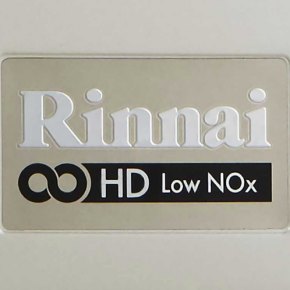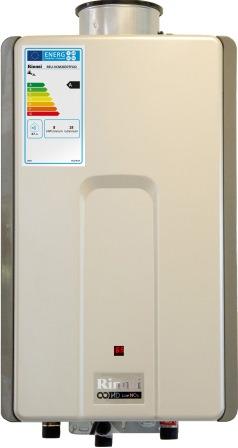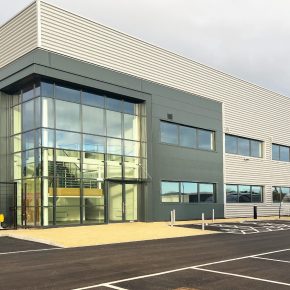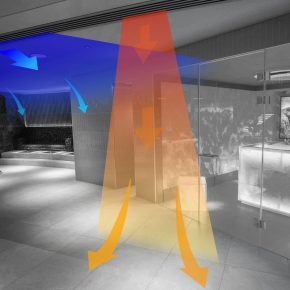
Rinnai with LPG: Low NOx, sustainable and perfect for off-grid
Rinnai condensing hot water heater units using LPG deliver lower carbon emission figures, greater energy efficiencies and are more economic to run than other sources, such as oil or electric.
This makes them the first choice for off-grid installations and sites.
For specifiers and installers, helping an off-grid user choose a low NOx energy efficient water heater is vital — and a condensing continuous flow water heater using LPG is amongst the most efficient and environmentally friendly options on offer.
By choosing a continuous flow water heater, as opposed to a standard electric water heater, an end user can lower energy costs by up to 50%, and reduce greenhouse gas emissions by up to 61%.
Furthermore, when compared with oil-fired systems, this saving is even greater.

Tests show that a Rinnai Infinity condensing water heater emits 35.18mg/kwh NOx, compared with a typical oil boiler that emits approximately 364 mg/kwh NOx.
That means a Rinnai condensing water heater emits approximately 10% of the NOx that an oil boiler emits, a 90% reduction; therefore, combining a gas boiler and a Rinnai water heater will dramatically reduce NOx.
On 26 September last year, the EU introduced new stricter parameters for NOx emissions in the gas water heater category, with the new NOx level set at 56mg/kwh.
Rinnai water heaters are well in advance of the criteria demonstrating product quality and superior performance.
The new criteria for oil fired boilers or liquid fuels has been set at 120mg/kwh, highlighting current appliances and the oil-fired market has a fair way to go before it can achieve a similar level to that of gas.
In comparing the production of CO₂ between gas and electricity, we find that for every GJ (277.78kW) of energy used, gas will produce 44.44kg compared to 103kg with electric. We can see that, for the same energy used, electricity will produce twice the amount of one of the major greenhouse gases.
The efficiency of this type of electrical generation is as low as 40%. So, if we now compare the use of electricity to LPG to heat hot water, we find electricity is 40% efficient, in comparison to a Rinnai water heater returning 107% nett efficiency.
Electricity is not the ‘green’ fuel that its marketing portrays it to be; it produces more CO₂ than LPG but is also less efficient, by some distance.
An LPG continuous flow water heater is an ‘on-demand’ system. When a hot-water tap is opened, the unit reads the demand and starts the heating process.
The water flows through a heat exchanger, where it heats to the desired temperature using only as much gas as is needed. When the tap is turned off, the heater automatically shuts off.
Latest news

2nd April 2025
FIT Show 2025 Launches Innovative Marketplace Feature to Enhancing Value for Installers
FIT Show, the UK’s leading event for the window, door, flat glass, hardware, and roofing industries, is excited to announce the launch of a brand new Marketplace feature at its upcoming 2025 event (Birmingham NEC, 29 April – 1 May).
Posted in Architectural Ironmongery, Articles, Building Industry Events, Building Industry News, Building Products & Structures, Doors, Exhibitions and Conferences, Glass, Glazing, Hand Tools, Innovations & New Products, Plant, Equipment and Hire, Power Tools, Restoration & Refurbishment, Retrofit & Renovation, Roofs, Seminars, Training, Windows
2nd April 2025
Hi-spec deployment of EJOT Colorfast at new Birmingham logistics park
EJOT Colorfast fasteners have been used extensively in the construction of eight new high-specification warehousing and logistics buildings at the Urban 8 Logistics Park in King’s Norton, Birmingham.
Posted in Articles, Building Industry News, Building Products & Structures, Building Systems, Case Studies, Facades, Restoration & Refurbishment, Retrofit & Renovation, Roofs, Walls
2nd April 2025
SWA member delivers ‘fresh Hope’ for university’s Sustainable Building department
A detailed contract to restore an iconic Art Deco building in the heart of Birmingham’s Jewellery Quarter was carried out by Steel Window Association member, The Window Repair Company (Northwest) Limited.
Posted in Articles, Building Associations & Institutes, Building Industry News, Building Products & Structures, Building Systems, Case Studies, Glass, Glazing, Restoration & Refurbishment, Retrofit & Renovation, Steel and Structural Frames, Sustainability & Energy Efficiency, Windows
1st April 2025
Gilberts Takes Thermal Comfort to New Heights
Gilberts Blackpool is continuing to build on its reputation as a pioneer with the unveiling of ThermaAstute™ – the most extensive range of thermally sensitive diffusers in the market.
Posted in Air Conditioning, Articles, Building Industry News, Building Products & Structures, Building Services, Facility Management & Building Services, Heating, Ventilation and Air Conditioning - HVAC, Innovations & New Products, Restoration & Refurbishment, Retrofit & Renovation, Sustainability & Energy Efficiency
 Sign up:
Sign up: